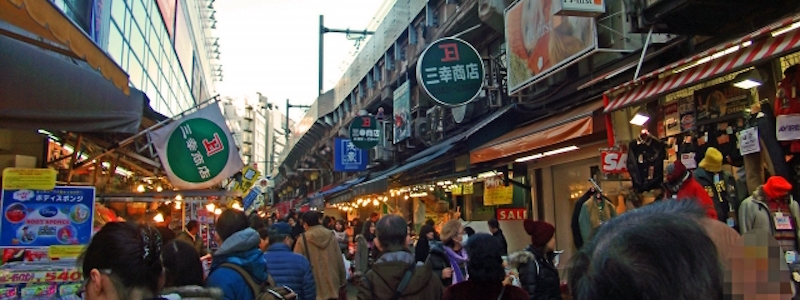Tokyo and Yokohama have a number of districts where many shops specialise in a particular kind of item. Use this guide to find out where to shop based on what you’re looking for.
Table of Contents
Fashion and Brand Goods
Tokyo is one of the fashion capitals of the world, and has a huge range of stores selling both international brands and homegrown styles. Ginza (銀座) is a high-class area in central Tokyo with a large number of dedicated brand stores in addition to numerous department stores. The area around Shibuya (渋谷) station is known for youth fashion, and the 109 Building, synonymous with “gyaru” fashion, is a particularly famous sight. Harajuku (原宿) is a district most famous for street fashion, particularly Takeshita dori, with a large number of small shops with unique styles. Harajuku merges with Omotesando (表参道), which by contrast hosts mainly international and high fashion brands.
Traditional Japanese Goods
Japan has a rich and varied culture, and there are many traditional craftsmen producing goods in Tokyo. In addition to its fashion outlets, Ginza (銀座) has a good number of shops selling items ranging from kimono to chopsticks and Japanese paper. Asakusa (浅草) is famous as a traditional crafts district, with items including pottery, kimono and handmade wooden items.
Souvenirs
Souvenir items can be found all over Tokyo, particularly at popular tourist attractions. There are a few areas with a large concentration of shops aimed at tourists looking for gifts to take home. In front of Sensōji Temple in Asakusa (浅草) is a street of stalls selling souvenirs of all kinds, while Ameyoko in nearby Ueno (上野) is a bustling tourist street with a market atmosphere. Completed in 2012, Tokyo Skytree Town is a large shopping complex attached to the tallest tower in the world. Many of the shops cater specifically to the vast number of tourists visiting the tower, with Skytree and Tokyo-themed souvenirs.
Electronics
At one time, Akihabara (秋葉原) was known as the electronics capital of Tokyo, and one of its station exits is still named “Electric Town”. However, with the growth of larger electrical chains, the area’s reputation for discount electrical goods has declined. The highest concentration of large electronics stores can now be found in Shinjuku (新宿), particularly around the West exit, where Yodobashi Camera and Bic Camera have sizeable offerings.
Pop and Sub-Culture
Japan’s Pop Culture and Subcultures are are rich and varied as its traditional cultural offerings. Akihabara (秋葉原) has long reigned as the heart of Japanese anime, manga and video game culture, collected under the label of “otaku” (nerd/geek). Shops here specialise in figurines and merchandise based on popular manga and anime franchises, while game centres and maid cafes offer their own unique forms of entertainment. Not as well-known but equally diverse is Nakano (中野) Broadway, an indoor shopping mall at the far end of Nakano Sun Mall, outside the north exit of Nakano station. The broadway is a maze of smaller shops selling not only anime goods but a large quantity of merchandise from western pop culture, from sci-fi tv and movie characters to Disney. Several shops also specialise in Japanese pop and rock music memorabilia.
Furniture and Homewares
While large chains such as IKEA and Nitori can be found in the outskirts of the city, central Tokyo is home to more traditional fare. In Meguro (目黒), a 3km stretch of Meguro-dori is known as “interior street”, with furniture shops on both sides. Between Ueno (上野) and Asakusa (浅草) you will find Kappabashi-dori, a street dedicated to kitchenwares and other things needed in the restaurant business, from restaurant furniture to plastic food displays. In Nippori (日暮里), Textile Town is a mile-long street with both retailers and wholesalers specialising in fabrics.
Second-Hand Goods
Used clothing stores are particularly common in Tokyo, and several areas have them in abundance. Kōenji (高円寺) in Suginami ward has numerous “furugi” (古着, second-hand clothes) shops along its main shopping arcade, in addition to several trendy cafes. A similar atmosphere can be found in Shimokitazawa (下北沢) in Setagaya or in Kichijōji (吉祥寺) in western Tokyo, both of which are famous for their youth culture. Meanwhile, Jimbōchō (神保町) is an area famous for second-hand books, including several with English selections. An annual book festival is held where shop owners set up stalls on the streets.
Ethnic Towns
Japan’s largest expat communities are Chinese and Korean. Unsurprisingly, there are strong influences from both cultures on the culture and cuisine, especially in the cities. Shin-Ōkubo (新大久保) is known as Tokyo’s Korean town, with many restaurants and shops selling Korean foods and cosmetics. The area also has a growing population from the subcontinent, and many shops sell Halal foods and ingredients from South Asia and the Middle East. Yokohama (横浜), meanwhile, has Japan’s largest Chinatown in southeastern Motomachi. In addition to the numerous tourist and souvenir shops, the streets are lined with all-you-can-eat buffet restaurants.
